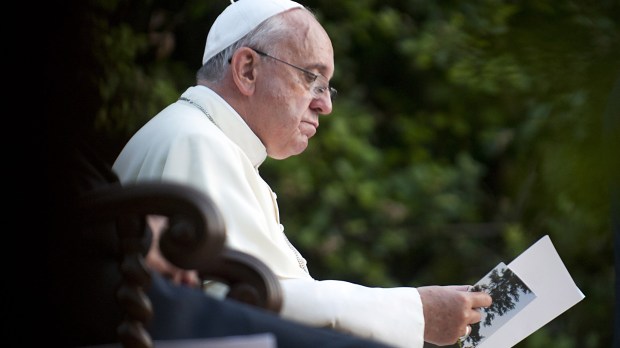At the end of the general audience on August 30, 2023, Pope Francis said that he “intends to publish an exhortation, a second Laudato si’” on October 4. The Pontiff called on Catholics to work to protect our “common home.”
The Pope also announced the opening of the “Time for Creation,” a month-long ecumenical gathering during which the Churches are invited to celebrate Creation and work for its protection through concrete action and prayer.
It begins on September 1 and ends on October 4.
October 4 is the feast day of St. Francis of Assisi, author of the Canticle of Creation, which opens the encyclical Laudato si’ and thus gives it its title.
In 2020, it was on this same date that the Pontiff – who chose to bear the name of the Umbrian saint – chose to sign his third encyclical – Fratelli Tutti– at the Poverello’s tomb in Assisi.
Apostolic exhortations are often written after a special synod, and are, as the name indicates, an “exhortation.”
Environmental crisis is a human crisis
The encyclical Laudato si’, on safeguarding the common home that God has created for humanity, was written with the backdrop of the United Nations conferences on climate change.
Pope Francis has recounted the genesis of this text on various occasions, explaining what he discussed with Ségolène Royal, then French Minister for Ecological Transition, during her visit to Strasbourg in 2014.
She told me that she had heard that I was writing something on the environment. I replied, yes I was talking to a group of scientists and also a group of theologians. She then said: “Please publish it before the Paris Conference.” So that was what happened …
Rarely has an encyclical had such an echo, even in circles far removed from Catholicism, as the concern about global warming goes well beyond confessional bounds. At the time of its publication, dozens of heads of state welcomed the position taken by the head of the Catholic Church.
While Laudato si’ was not the first encyclical to “address the problem,” it was the first “to take ecology as its sole subject,” points out Dominican Thomas Michelet, in the book Les papes et l’écologie (Artège, 2016).
The publication of this “sequel” to Laudato si’ comes just under two months before COP28 in Dubai, United Arab Emirates. This country has established itself as a partner of the Holy See on the diplomatic scene since 2019 and the signing on its soil of the Document on Human Fraternity by Pope Francis and the Grand Imam of Al-Azhar, Ahmed el-Tayyeb.
As Benedict said …
Francis himself does not classify it as a “green” encyclical, saying that in fact it falls in the great tradition of the Church’s “social encyclicals.” In it, the Pontiff makes above all a call to personal conversion, noting how the environmental crisis is inseparable from a human crisis.
Here, he picks up the teaching of his predecessors.
Benedict XVI, often dubbed the “green pope,” was a strong advocate of a Christian vision of ecology and what he called a “human ecology.”
In 2010, for example, in his message for that year’s World Day of Peace, he offered this reflection:
The Church has a responsibility towards creation, and she considers it her duty to exercise that responsibility in public life, in order to protect earth, water and air as gifts of God the Creator meant for everyone, and above all to save mankind from the danger of self-destruction. The degradation of nature is closely linked to the cultural models shaping human coexistence: consequently, “when ‘human ecology’ is respected within society, environmental ecology also benefits”. Young people cannot be asked to respect the environment if they are not helped, within families and society as a whole, to respect themselves. The book of nature is one and indivisible; it includes not only the environment but also individual, family and social ethics. Our duties towards the environment flow from our duties towards the person, considered both individually and in relation to others.
Hence I readily encourage efforts to promote a greater sense of ecological responsibility which, as I indicated in my Encyclical Caritas in Veritate, would safeguard an authentic “human ecology” and thus forcefully reaffirm the inviolability of human life at every stage and in every condition, the dignity of the person and the unique mission of the family, where one is trained in love of neighbour and respect for nature. There is a need to safeguard the human patrimony of society. This patrimony of values originates in and is part of the natural moral law, which is the foundation of respect for the human person and creation.
September 1 is the World Day of Prayer for the Care of Creation, instituted by Pope Francis in 2015.

